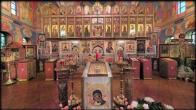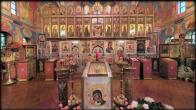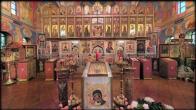You are here
Western Theology
In Part I in condensed form, we attempted to respond to the question - what is Orthodoxy. Now it behooves us to begin our investigation of the doctrinal differences between the Christian East and the West.
First of all, it is essential for us to understand the main cultural and psychological peculiarities in which the theology of the West developed. This will help us to evaluate better the extent of the errors of the Roman Catholic and Protestant confessions in comparison with the Apostolic and patristic teaching of the Orthodox Church.
We shall call on the well-known Greek Church writer, Doctor Alexander Kalomiros, for help, and shall turn to his remarkable work, "The River of Fire".
At the beginning of his article, Kalomiros, poses such questions: "...what was the instrument of the devil's slandering of God? What means did he use in order to convince humanity, in order to pervert human thought?" The author answers: "He used 'theology." He first introduced a slight alteration in theology which, once it was accepted, he managed to increase more and more to the degree that Christianity became completely unrecognizable. This is what we call "Western theology."
Further on in the article, "The River of Fire", Doctor Kalomiros writes that Western theology's "principle characteristic is that it considers God as the real cause of all evil." The author notes that "all Roman Catholics and most Protestants consider death as a punishment from God." According to this teaching, "God considered all men guilty of Adam's sin and punished them by death, that is by cutting them away from Himself; depriving them of His life-giving energy, and so killing them spiritually at first and later bodily, by some sort of spiritual starvation."
Doctor Kalomiros writes further that "some Protestants consider death not as a punishment but as something natural. But is not God the creator of all natural things? So in both cases, God - for them - is the real cause of death. (... )
"The 'God' of the West is an offended and angry God, full of wrath for the disobedience of men, who desires in His destructive passion to torment all humanity unto eternity for their sins, unless He receives an infinite satisfaction for His offended pride.
"What is the Western dogma of salvation? Did not God kill God in order to satisfy His pride, which the Westerners euphemistically call justice?"
Western theology teaches that "salvation... is to be saved from the hands of God! (...)
"This juridical conception of God, this completely distorted interpretation of God's justice, was nothing else than the projection of human passions on theology. It was a return to the pagan process of humanizing God and deifying man. Men are vexed and angered when not taken seriously and consider it a humiliation which only vengeance can remove, whether it is by crime or by duel. This was the worldly, passionate conception of justice ...
"Western Christians thought about God's justice in the same way also; God, the infinite Being, was infinitely insulted by Adam's disobedience. He decided that the guilt of Adam's disobedience descended equally to all His children, and that all were to be sentenced to death for Adam's sin, which they did not commit. God's justice for Westerners operated like a vendetta. Not only the man who insulted you, but also all his family must die. And what was tragic for men, to the point of helplessness, was that no man, nor even all humanity, could appease God's insulted dignity, even if all men in history were to be sacrificed. God's dignity could be saved only if He could punish someone of the same dignity as He. So in order to save both God's dignity and mankind, there was no other solution than the incarnation of His Son, so that a man of godly dignity could be sacrificed to save God's honor."
Doctor Kalomiros considers that such a pagan concept of God's justice makes God the source of all our misfortunes. But such a justice is not at all justice, the author considers, since it punishes men who are completely innocent of the sin of their forefathers. "...what Westerners call justice ought rather to be called resentment and vengeance of the worst kind. Even Christ's love and sacrifice lose their significance and logic in this schizoid notion of a God who kills God in order to satisfy the so-called justice of God."
Further, Kalomiros turns to the understanding of the justice of God as it is set forth in Sacred Scripture and its interpretation by the Holy Fathers of the Church. In the Greek language, in which Ahe Bible has come down to us, justice is called dikaiosune. Dikaiosune is a translation of the Hebrew word, tsedaka. This means "the divine energy which accomplishes man's salvation." It corresponds "to the other Hebrew word, besed, which means Smercy," compassion," "love," and to the word, emeth, which means "fidelity," "truth." " This is a completely different concept than what we usually call justice. Kalomiros writes that in the West the word dikaiosune was understood the way the men of the pagan, humanistic Greek civilization of antiquity understood it -"human justice, the one which takes place in court."
Kalomiros writes that "God is not just, with the human meaning of this word. His justice means His goodness and love, which are given in an unjust manner, that is, God always gives without taking anything in return, and He gives to persons like us who are not worthy of receiving. (... )
"God is good, loving and kind toward those who disregard, disobey and ignore Him. He never returns evil for evil, He never takes vengeance. His punishments are loving means of correction, as long as anything can be corrected and healed in this life. (... ) The eternally evil has nothing to do with God. It comes rather from the will of His free, logical creatures, and this will he respects.
"Death was not inflicted upon us by God. We fell into it by our revolt. God is Life and Life is God. We revolted against God, we closed our gates to His live-giving grace. "For as much as he departed from life," wrote Saint Basil, "by so much did he draw nearer to death. For God is Life, deprivation of life is death." "God did not create death,' continues Saint Basil, 'but we brought it upon ourselves." (... ) As Saint Irenaeus puts it: "Separation from God is death, separation from light is darkness... and it is not the light which brings upon them the punishment of blindness."
"'Death," says Saint Maximus the Confessor, "is principally the separation from God, from which followed necessarily the death of the body. Life is principally He who said,"I am the Life."
"And why did death come upon the whole of humanity? Why did those who did not sin with Adam die as did Adam?" The author replies with the words of Saint Anastasius the Sinaite: "We became the inheritors of the curse in Adam. We were not punished as if we had disobeyed that divine commandment along with Adam; but because Adam became mortal, he transmitted sin to his pos-terity. We became mortal since we were born from a mortal."
The author writes further that Blessed Augustine, Anselm of Canterbury, Thomas Aquinas and the other founders of Western theology are guilty of this calumny against God. Of course, they did not affirm "expressed and clearly that God is a wicked and passionate being. They rather consider God as being chained by a superior force, by a gloomy and implacable Necessity, like the one which governed the pagan gods. This necessity obliges Him to return evil for evil and does not permit Him to pardon and to forget the evil done against His will, unless an infinite satisfaction is offered to Him."
Further on in the article, "The River of Fire", the author writes of the influence of Greek paganism on western Christianity:
"The pagan mentality was in the foundation of all heresies. It was very strong in the East, because the east was the cross road of all philosophical and religious currents. But as we read in the New Testament, 'where sin abounded, grace did much more abound.' So when heresies flourished, Orthodoxy flourished also, and although it was persecuted by the mighty of this world, it always survived victorious. In the West, on the contrary, the pagan Greek mentality entered in unobtrusively, without taking the aspect of heresy. It entered in through the multitude of Latin texts dictated by Augustine, Bishop of Hippo. (... ) In the West, little by little knowledge of the Greek language vanished, and Augustine's texts were the only books available dating from ancient times in a language understood there. So the West received as Christian a teaching which was in many of its aspects pagan. Caesaro-papist developments in Rome did not permit any healthy reaction to this state of affairs, and so the West was drowned in the humanistic, pagan thought which prevails to this day.
"So we have the East on the one side which, speaking and writing Greek, remained essentially the New Israel with Israelitic thought and sacred tradition, and the West on the other side which having forgotten the Greek language and having been cut of from the Eastern state, inherited pagan Greek thought and its mentality, and formed with it an adulterated Christian teaching.
"In reality, the opposition between Orthodoxy and Eastern Christianity is nothing else but the perpetuation of the opposition between Israel and Hellas.
"We must never forget that the Fathers of the Church considered themselves to be the true spiritual children of Abraham, that the Church considered itself to be the New Israel, and that the Orthodox peoples, whether Greek, Russian, Bulgarian, Serbian, Romanian, etc., were conscious of being like Nathaniel, true Israelites, the People of God. And while this was the real consciousness of Eastern Christianity, the West became more and more a child of pagan, humanistic Greece and Rome."
©V.Potapov, 1996-98
PARISH LIFE
RECENT VIDEOS
Address of our Cathedral
Subscribe to our mailing list
While all the materials on this site are copyrighted, you may use them freely as long as you treat them
with respect and provide attribution on the Russian Orthodox Cathedral of St.John the Baptist of Washington DC.









